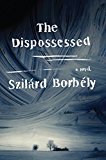
A literary sensation on its original publication in Hungary, this hypnotic, hauntingly beautiful first novel from the acclaimed, award-winning poet and author Szilárd Borbély depicts the poverty and cruelty experienced by a partly-Jewish family in a rural village in the late 1960s and early 1970s.
In a tiny village in northeast Hungary, close to the Romanian border, a young, unnamed boy warily observes day-to-day life and chronicles his family's struggles to survive. Like most of the villagers, his family is desperately poor, but their situation is worse than most - they are ostracized because of his father's Jewish heritage and his mother's connections to the Kulaks, who once owned land and supported the fascist Horthy regime before it was toppled by Communists.
With unflinching candor, the little boy's observations are related through a variety of narrative voices - crude diatribes from his alcoholic father, evocative and lyrical tales of the past from his grandparents, and his own simple yet potent prose. Together, these accounts reveal not only the history of his family but that of Hungary itself, through the physical and psychic traumas of two World Wars to the country's treatment of Jews, both past and present.
Drawing heavily on Borbély's memories of his own childhood, The Dispossessed is an extraordinarily realistic novel. Raw and often brutal, yet glimmering with hope, it is the crowning achievement of an uncompromising talent.
"Starred Review. An exquisite addition to any library of the dark, the bleak, and the absurd, Borbély's inauguration into English is a magnificent one." - Kirkus
"This immensely powerful portrait of poverty is at once a window into an often obscured history, and a timeless testament to the struggle of those in need." - Publishers Weekly
"While the short declarative sentences may seem somewhat repetitious, every page is laden with significance, and though some readers may not enjoy the education Borbély gives them, most will find much to ponder in this moving literary novel that compares favorably to both Elie Wiesel's Night (1960) and Philip Hensher's Scenes from Early Life (2013) for their disturbingly clear descriptions and autobiographical nature." - Booklist
"No one has ever written so beautifully and at the same time so without pity about the suffering in the isolated provincial villages of Hungary…His sentences have a surgical precision, and their sustained rhythm only reinforces the power of what they evoke." - Frankfurter Allgemeine Zeitung (Germany)
"Szilárd Borbély is the most enigmatic poet of recent Hungarian literature. His work, and he himself, are characterized by such extremes that, in any usual case, could never lead any single way. Straining within his life and work were fatally divergent forces: to hold them together, somehow, was his calling on this earth. And he held them together for as long as he could. Then he couldn't bear it any longer. And we became - without him - the Dispossessed. No one will ever be able to grasp him in full." - László Krasznahorkai, Winner of the 2015 Man Booker International Prize
"Szilárd Borbély wrote to me in a letter: 'The frightening situation in our country…I have the feeling, the intuition that I'm living in a sick society that makes its members ill.' In all of Hungarian poetry, Borbély was the most promising, and the most lost, of poets, one who could have looked forward to a great and brilliant future." - Imre Kertesz, Winner of the Nobel Prize in Literature
This information about The Dispossessed was first featured
in "The BookBrowse Review" - BookBrowse's membership magazine, and in our weekly "Publishing This Week" newsletter. Publication information is for the USA, and (unless stated otherwise) represents the first print edition. The reviews are necessarily limited to those that were available to us ahead of publication. If you are the publisher or author and feel that they do not properly reflect the range of media opinion now available, send us a message with the mainstream reviews that you would like to see added.
Any "Author Information" displayed below reflects the author's biography at the time this particular book was published.
Szilárd Borbély (1963-2014) is widely acknowledged as one of the most important poets to emerge in post-1989 Hungary. He worked in a wide variety of genres, including essay, drama, and short fiction, usually dealing with issues of trauma, memory, and loss. His poems have appeared in English translation in The American Reader, Asymptote, and Poetry. Forthcoming as well is his verse collection Berlin-Hamlet from NYRB Classics. Borbély received many awards for his work, including the Attila József Prize.




Dictators ride to and fro on tigers from which they dare not dismount. And the tigers are getting hungry.
Click Here to find out who said this, as well as discovering other famous literary quotes!
Your guide toexceptional books
BookBrowse seeks out and recommends the best in contemporary fiction and nonfiction—books that not only engage and entertain but also deepen our understanding of ourselves and the world around us.